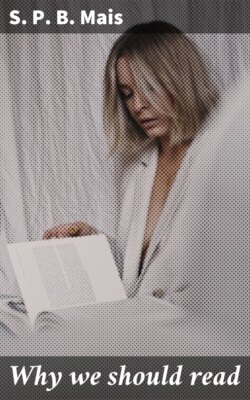Читать книгу Why we should read - S. P. B. Mais - Страница 18
На сайте Литреса книга снята с продажи.
III
THE POEMS OF IRIS TREE
ОглавлениеTable of Contents
Iris Tree is worth reading for her vivacity, her hatred of shams, her intellectual fireworks, her simple love of the beautiful, her youthful rebellion, her sense of colour, her harmony, her humour, but most of all for this:
"Many things I'd find to charm you,
Books and scarves and silken socks,
All the seven rainbow colours,
Black and white with 'broidered clocks.
Then a stick of polished whalebone
And a coat of tawny fur,
And a row of gleaming bottles
Filled with rose-water and myrrh.
Rarest brandy of the 'fifties,
Old liqueurs in leather kegs,
Golden Sauterne, copper sherry
And a nest of plovers' eggs.
Toys of tortoise-shell and jasper,
Little boxes cut in jade;
Handkerchiefs of finest cambric,
Damask cloths and dim brocade,
Six musicians of the Magyar,
Madness making harmony;
And a bed austere and narrow
With a quilt from Barbary.
You shall have a bath of amber,
A Venetian looking-glass,
And a crimson-chested parrot
On a lawn of terraced grass.
Then a small Tanagra statue
Found anew in ruins old,
Or an azure plate from Persia,
Or my hair in plaits of gold;
Or my scalp that like an Indian
You shall carry for a purse,
Or my spilt blood in a goblet …
Or a volume of my verse."
If this doesn't make you rush out and buy her poems, nothing will. It is the topmost level of her achievement, and it is an achievement that even so musical a poet as Walter de la Mare would not be ashamed of having written. Where, I would know, has the love of little material things been so deliciously, so naïvely confessed by any other poet? Listen to her in rebellious mood:
"You preach to me of laws, you tie my limbs
With rights and wrongs and arguments of good,
You choke my song and fill my mouth with hymns,
You stop my heart and turn it into wood.
I serve not God, but make my idol fair
From clay of brown earth, painted bright with blood,
Dressed in sweet flesh and wonder of wild hair
By Beauty's fingers to her changing mood.
The long line of the sea, the straight horizon,
The toss of flowers, the prance of milky feet,
And moonlight clear as grass my great religion,
And sunrise falling on the quiet street.
The coloured crowd, the unrestrained, the gay,
And lovers in the secret sheets of night
Trembling like instruments of music, till the day
Stands marvelling at their sleeping bodies white."
Here, surely, is that love of beauty, finely expressed, which is the first thing we look for in any true poet. She invokes the aid of her "three musketeers of faithful following," Love, Humour and Rebellion, and these three stalwarts never desert her, and one finds oneself wishing that some other poets had had the good sense to recruit the services of such helpful henchmen.
Especially pleasant is it to find that she has not yet outgrown her youthful pessimism: once youth has passed, time cries for self-expression in other ways than these:
"There are songs enough of love, of joy, of grief:
Roads to the sunset, alleys to the moon:
Poems of the red rose and the golden leaf,
Fantastic faery and gay ballad tune.
The long road unto nothing I will sing,
Sing on one note, monotonous and dry,
Of sameness, calmness and the years that bring
No more emotion than the fear to die.
Grey house, grey house and after that grey house,
Another house as grey and steep and still:
An old cat tired of playing with a mouse,
A sick child tired of chasing down the hill."
There are nothing like enough songs of love or of joy, and no one knows that better than Iris Tree, but Youth loves to drench itself in hopeless greyness, if only to run through the whole gamut of human emotions, "just for fun." It is like a child's dressing up in a myriad different costumes:
"I see myself in many different dresses …
I see myself the child of many races,
Poisoners, martyrs, harlots and princesses;
Within my soul a thousand weary traces
Of pain and joy and passionate excesses. … "
Much more significant of maturity is her bizarre Sonnet for Would-be Suicides (that is my title for it, not hers):
"How often, when the thought of suicide
With ghostly weapon beckons us to die,
The ghosts of many foods alluring glide
On golden dishes, wine in purple tide
To drown our whim. Things danced before the eye
Like tasselled grapes to Tantalus: the sly
Blue of a curling trout, the battened pride
Of ham in frills, complacent quails that lie
Resigned to death like heroes—July peas,
Expectant bottles foaming at the brink—
White bread, and honey of the golden bees—
A peach with velvet coat, some prawns in pink,
A slice of beef carved deftly, Stilton cheese,
And cups where berries float and bubbles wink."
One at least of her faithful musketeers has served her to excellent purpose in this eminently philosophical poem. Uncle Max's eyes must twinkle with sheer merriment every time he reads this: it must be pleasant to have a niece so capable of profiting by his genius. Another friend of the family, Rupert Brooke, must have appreciated the panegyric on Worms. He may have directly inspired it:
